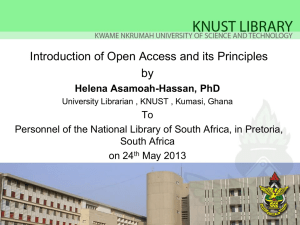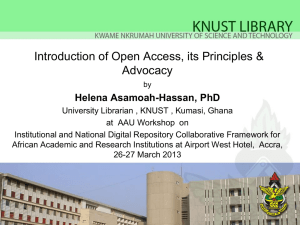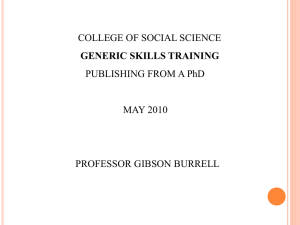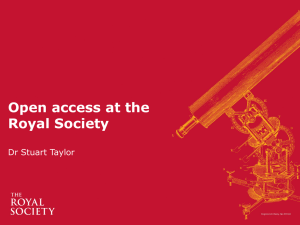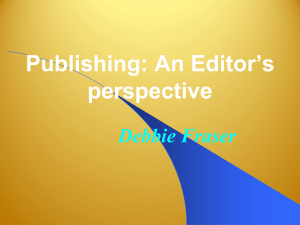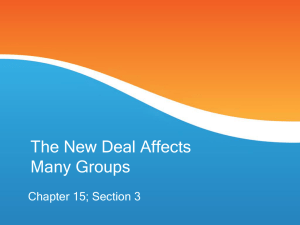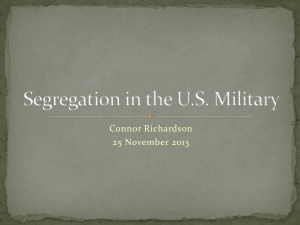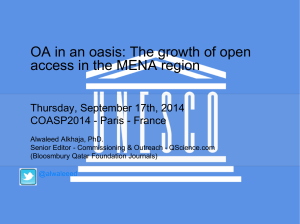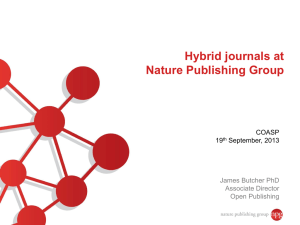Slides - OASPA
advertisement
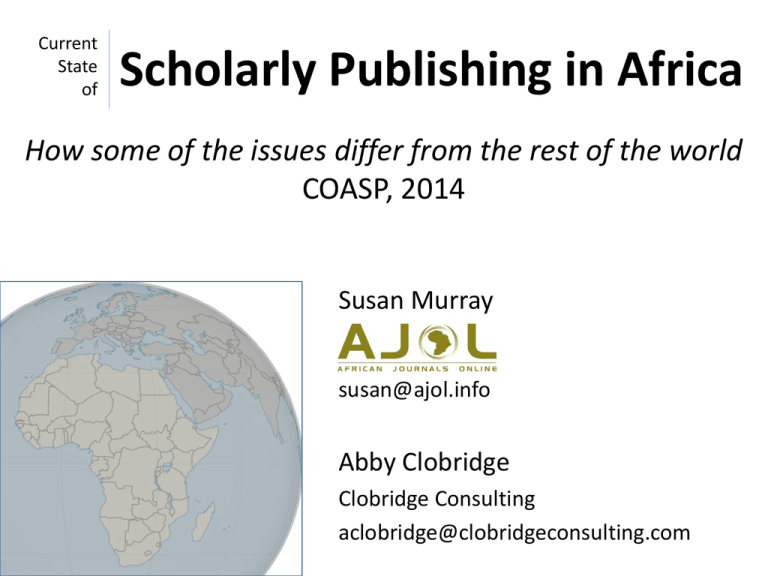
Current State of Scholarly Publishing in Africa How some of the issues differ from the rest of the world COASP, 2014 Susan Murray susan@ajol.info Abby Clobridge Clobridge Consulting aclobridge@clobridgeconsulting.com Background • Various projects on global publishing scene and specific elements of scholarly publishing, but little specifically on Africa • important because: “Focus on African problems/challenges could make research unpublishable in other countries” • Hypothesis: Dynamic publishing scene in Africa, but issues, trends, challenges not always the same in African context as at global level – eg: OA, print vs. online, management of journals, predatory OA, today’s key issues 330 responses from 32 African countries Country Responses South Africa 105 Nigeria 99 Egypt 19 Ethiopia 18 Ghana 13 Kenya 13 Uganda 8 Tanzania 6 5 – 2 responses: Sudan (5), Algeria (3), Cameroon (3), Madagascar (3), Rwanda (3), Botswana (2), Ivory Coast (2), Morocco (2), Mozambique (2), Senegal (2), Togo (2), Tunisia (2), Zambia (2), Zimbabwe (2) 1 response: Burkina Faso, Burundi, Democratic Republic of the Congo, Guinea, Libya, Malawi, Mauritius, Sierra Leone, Somalia, Angola, Benin, Cape Verde, Central African Republic, Chad, Comoros, Djibouti, Equatorial Guinea, Eritrea, Gabon, Gambia, GuineaBissau, Lesotho, Liberia, Mali, Mauritania, Namibia, Niger, Republic of the Congo, Sao Tome, Seychelles, Somaliland, South Sudan, Swaziland, Western Sahara This presentation • The African continent is characterized by diversity and complexity. South Africa, particularly, is not always representative of the “typical” Africanpublished journal and its context. • It is possible to make some useful generalizations… patterns and items of interest that have emerged • firstly related to African journal publishing in general, and then regarding African Open Access journal publishing. A “typical” African journal • Huge preponderance of “scholar journals” (which cannot afford dedicated staff members) published by career academics “after hours” • One third university-published (needs more exploration), one third society published, and only 19% by a professional publisher. • It is not just peer-reviewing that’s voluntary… the norm in African journals is that almost everything is reliant on volunteerism. • Unlike Northern journals, most Africanpublished journals still have to have a print version, despite it being the biggest expense item for majority of African journals. • Required (or preferred) by university libraries, readers, promotion committees at universities, society, indexing services, funder • Considered necessary by the journal for accessibility by target readership, due to lack of reliable internet and/or electricity, particularly in rural areas, and in poorer African countries • ICT skills shortages on the part of readers, authors, and journal staff and editorial board • Hard copy considered by some to be more prestigious and authoritative than the online version • Editor in Chief largely conducts day-to-day operations of the journal, and is also responsible for the continuation and future of the journal. • Compared with journals run out of the global North, a tremendous amount of responsibility – and burden – rests on a single individual or a small group of highlyinvolved editors. • Journals of all publishing and business models are characterized by resource and financial scarcity. • Cost recovery in all publishing models is difficult • • • • • low (or no specific) funding from African governments diminishing research funding too little institutional support (financial and other) few subscribers, most readers can’t afford to pay most authors (or author’s institutions) can’t afford APCs… not just a matter of “resistance to APCs”. • Nearly a third of respondents of all publishing models operate their journal on a completely cashfree basis, with no income or revenue at all, relying on volunteers and (seemingly often unwittingly provided) in kind support from their institution • When income is generated, this sometimes goes to small honorariums for the Editor-in-chief, Editorial Board, or to peer-reviewers. • Paying peer-reviewers??... Expert reviewers are extremely difficult to source in Africa, and frequently mentioned as a major constraint. • African journals operate in a context where their target authors are encouraged to publish overseas… • journals face a disconnect between African universities’ promotion policies (that reward African authors for publishing in an overseas IF journals); and the simultaneous pressure to publish quality, contextually relevant, development-oriented content. • the Impact Factor was mentioned frequently by respondents… either as an over-riding but exceedingly difficult to attain goal for the journal, or in recognition of how inappropriate a measure of journal quality it is for African titles • latter was nicely termed by one respondent as “impact factor fundamentalism”. Open Access Immediate OA Embargoed OA Hybrid OA Subscription only Don't know Of the OA Journals: 0 20 40 60 80 Always OA 100 120 140 6 of these were OA at one point but transitioned to subscription Subscription to OA 0 20 40 60 80 100 120 160 • Definitions of OA… full text online for free is OA… Licensing isn’t on the radar of most OA journals from Africa • However (and this was a surprise that needs to be explored further), journals are fairly likely to allow authors to add the final version of record article to an institutional or subject repository. • Another surprise was how very positive many journals are about their future • and about how many expect OA to be more significant in African journal publishing in future. Despite the optimism; serious concerns… “Open Access is of course a major issue and very complex for those living and operating in Africa... Discussion needs to be grounded in the operational aspects of running journals and the very real costs involved and also the importance of knowledge production from local contexts.” “With majority of research in Africa now collaborative; work will ultimately be published in more established "Northern Hemisphere" journals that have high impact factors and greater prestige.” “The place of local and regional journals needs more recognition and these titles are under more pressure than ever in the increasingly globalized and increasingly OA worlds.” • Answers about “article-processing charges” (APCs) – a concept that is widely used in North America, Europe, and Australia to recoup publishing costs specifically for Open Access – showed that in Africa, author-side fees are not specific to Open Access publishing. • Given that resource scarcity is the norm, and page charges and other author side fees are often already actively utilized by all publishing models, it is difficult to see how the “polish” of Northern publishing quality can be attained, despite the optimism of many respondents Beyond the research… If African journals are to become unstuck from their position between a rock and a hard place • In Latin America, public funding has allowed the emergence of gold OA journals that do not charge readers AND do not charge authors. • Perhaps this is a model other developing regions, like Africa, need to adopt. • Can the vicious cycle of IF prestige be broken? More Information Forthcoming: Report Available October 2014 (Details TBA) For the full research report, and then AJOL’s OA advocacy strategy… watch this space! Susan Murray susan@ajol.info Abby Clobridge aclobridge@clobridgeconsulting.com Current State of Scholarly Publishing in Africa www.clobridgeconsulting.com/scholarly-publishing-in-africa
